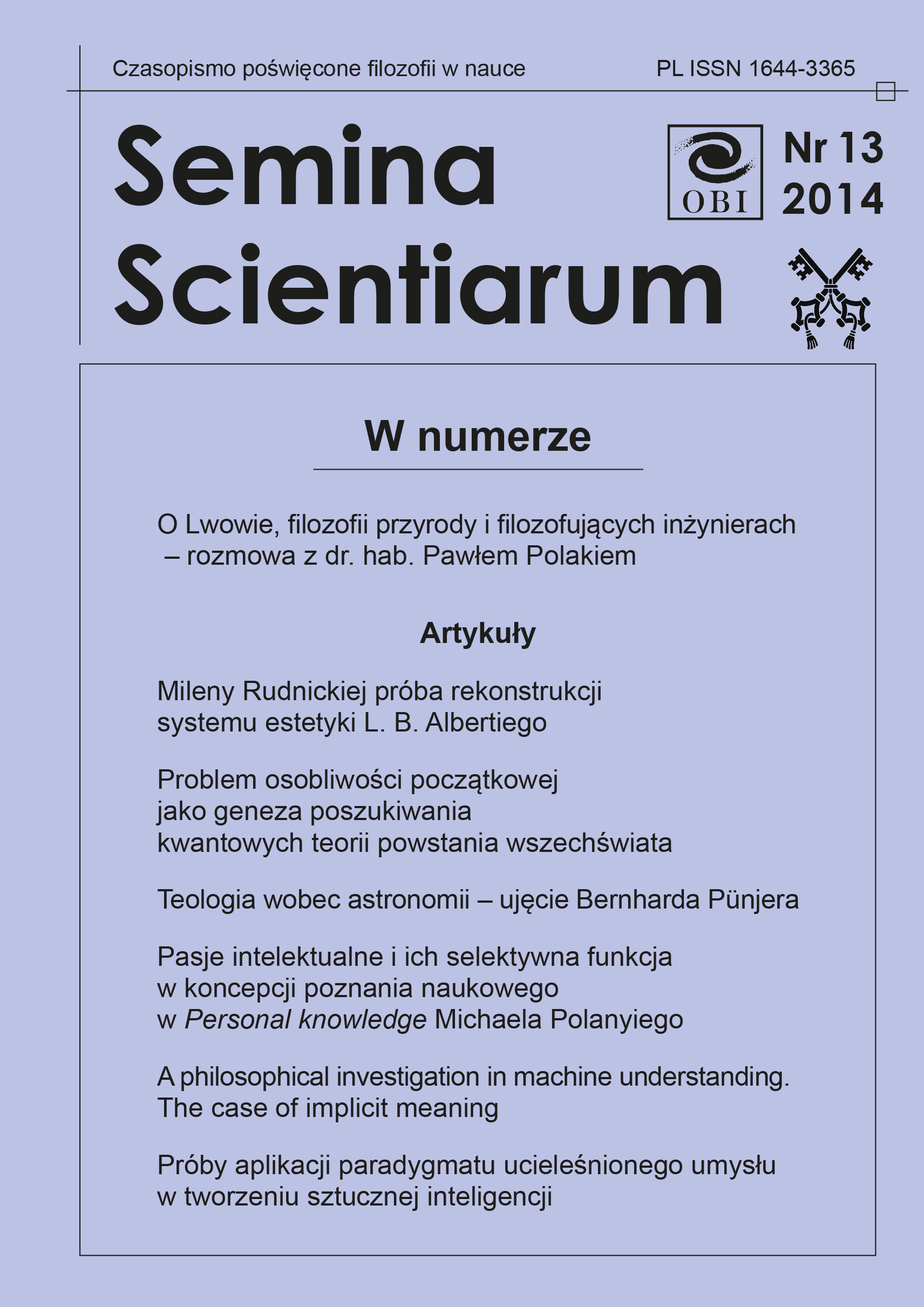Kryzys podstaw matematyki przełomu XIX i XX wieku
DOI:
https://doi.org/10.15633/ss.701Słowa kluczowe:
set theory, logicism, intuitionism, formalism, crisis of the basis of mathematics, finitary methodsAbstrakt
By the end of the 19th century, mathematics had become very intensively developed. Mathematical logic became an independent discipline, and in the 1880s Cantor published his work on set theory. All this led to questions about the consistency of mathematical theories and decidability theorems. Therefore, for the second time in the history of mathematics, there emerged a crisis of the basis of mathematics.
There were a few ideas for overcoming the crisis. In this paper, there will be described three trends in the philosophy of mathematics in the late 19th and early 20th centuries: logicism (Frege), intuitionism (Brouwer) and formalism (Hilbert). These three trends were described from the philosophical point of view and in the context of the crisis. Moreover, for each of them there will be present the most important methodological assumptions, and I will briefly describe attempts to achieve them. This will describe the problem in such a way that allows for the grasping of important differences and similarities between logicism, intuitionism and formalism and better understand their causes.
Bibliografia
Cantor G., Grundlagen einer allgemeinen Mannigfaltigkeitslehre, Leipzig 1883 (fragment), [w:] Filozofia matematyki. Antologia tekstów klasycznych, wybór, przekład i komentarze R. Murawski, Poznań 1994, s. 157.
Cantor G., Mitteilungen zur Lehre vom Transfiniten, „Zeitschrift f. Philosophie und philos Kritik” 91 (1887), 81–125; 92 (1888) 240–265 (fragmenty), [w:] Filozofia matematyki. Antologia tekstów klasycznych, wybór, przekład i komentarze R. Murawski, Poznań 1994, s. 160–171.
Cantor G., Beiträge zur Begründung der transfiniten Mengenlehre, „Mathematische Annalen” 46 (1895), 481–512, §1 „Der Mächtigkeitsbegriff oder die Kardinalzahl“, [w:] Filozofia matematyki. Antologia tekstów klasycznych, wybór, przekład i komentarze R. Murawski, Poznań 1994, s. 157–159.
Heyting A., Intuitionism. An introduction, North-Holland Publishing Company, Amsterdam 1966, wyd. 2, part. I, „Disputation”, 1–12, [w:] Filozofia matematyki. Antologia tekstów klasycznych, wybór, przekład i komentarze R. Murawski, Poznań 1994, s. 276–286.
Brouwer L. E. J., Intuitionisme en formalisme, Amsterdam 1912, [w:] Filozofia matematyki. Antologia tekstów klasycznych, wybór, przekład i komentarze R. Murawski, Poznań 1994, s. 263–275.
From Frege to Gödel. A Source Book in Mathematical Logic 1879–1931, ed. J. van Heijenoort, Cambridge, Massachusetts 1967, 124–125, [w:] Filozofia matematyki. Antologia tekstów klasycznych, wybór, przekład i komentarze R. Murawski, Poznań 1994, s. 221–222.
Frege G., Nachgelassene Schriften und Wissenschaftlicher Briefwechsel, eds. H. Hermes, F. Kambartel, F. Kaulbach, t. 2: Wissenschaftlicher Briefwechsel, Hamburg 1976, 212–215, [w:] Filozofia matematyki. Antologia tekstów klasycznych, wybór, przekład i komentarze R. Murawski, Poznań 1994, s. 203–204.
Frege G., Die Grundlagen der Arithmetik. Eine logisch matematische Untersuchung über den Begriff der Zahl, Breslau 1884, wstęp (fregment), [w:] Filozofia matematyki. Antologia tekstów klasycznych, wybór, przekład i komentarze R. Murawski, Poznań 1994, s. 176–203.
Hilbert D., Über das unendliche, „Matematische Annalen” 95 (1926), 161–190, [w:] Filozofia matematyki. Antologia tekstów klasycznych, wybór, przekład i komentarze R. Murawski, Poznań 1994, s. 288–307.
Russell B., Mathematics and the Metaphysicians, w: Mysticism and Logic and other Essays, London 1949, wyd. 8, [w:] Filozofia matematyki. Antologia tekstów klasycznych, wybór, przekład i komentarze R. Murawski, Poznań 1994, s. 206–221.
Dadaczyński J., Antynomie teoriomnogościowe a powstanie klasycznych kierunków badania podstaw matematyki, „Zagadnienia Filozoficzne w Nauce” 2000, nr 26, s. 38–58.
Murawski R., Filozofia matematyki. Zarys dziejów, Warszawa 1995.
Pobrania
Opublikowane
Numer
Dział
Licencja
Twórca oświadcza, że przysługują mu prawa autorskie do utworu i że nie są ograniczone w zakresie objętym niniejszym oświadczeniem oraz że utwór jest dziełem oryginalnym i nie narusza praw autorskich innych osób.
Twórca zezwala Uniwersytetowi Papieskiemu Jana Pawła II w Krakowie na nieodpłatne, niewyłączne i nieograniczone w czasie korzystanie z utworu, to jest:
- utrwalanie i zwielokrotnianie: wytwarzanie egzemplarzy utworu techniką drukarską, reprograficzną, zapisu magnetycznego oraz techniką cyfrową;
- obrotu oryginałem albo egzemplarzami, na których utwór utrwalono (wprowadzanie do obrotu, użyczenie lub najem oryginału albo egzemplarzy, publiczne wystawienie, wyświetlenie, a także publiczne udostępnianie utworu w taki sposób, aby każdy mógł mieć do niego dostęp w miejscu i w czasie przez siebie wybranym);
- włączenie utworu w skład utworu zbiorowego;
- udzielanie przez Uniwersytet Papieski Jana Pawła II w Krakowie sublicencji Creative Commons Uznanie autorstwa-Użycie niekomercyjne-Bez utworów zależnych 3.0 Polska
Uniwersytet Papieski Jana Pawła II w Krakowie udostępnia utwór na Platformie Czasopism należącej do uczelni, na licencji Creative Commons Uznanie autorstwa-Użycie niekomercyjne-Bez utworów zależnych 3.0 Polska. Tym samym uprawnia wszystkich zainteresowanych do korzystania z utworu pod następującymi warunkami:
- zostanie podany autor i tytuł utworu,
- zostanie podane miejsce publikacji (tytuł czasopisma i adres internetowy do oryginalnie opublikowanego utworu),
- utwór będzie dystrybuowany w sposób niekomercyjny,
- nie będą tworzone utwory zależne.

